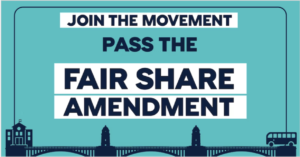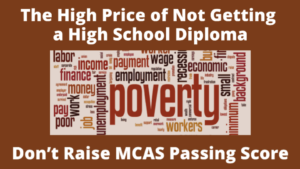Save the evening of Tuesday, December 13, to help us honor and celebrate three historic education justice victories by these groups: Massachusetts Advocates for Children, Raise Up Massachusetts, and Our City, Our Schools. CPS members and non-members are welcome! Register here.
- Massachusetts Advocates for Children broke down barriers and created new opportunities for students with intellectual disabilities, autism, and other developmental disabilities by helping to pass a law, the first of its kind in the nation, improving access to post-secondary education for these students.
- Raise Up Massachusetts built a powerful statewide coalition to win the Fair Share Amendment, a constitutional amendment which will raise an estimated $2 billion a year for public education and transportation.
- And the Our City, Our Schools coalition made a strong stand for democratic, local control of public schools by pushing back and stopping a proposed state takeover of Boston Public Schools.
- In addition to honoring these public education campaigns, we will present the Education Justice Lifetime Achievement Award to CPS Board Member Jean McGuire.






